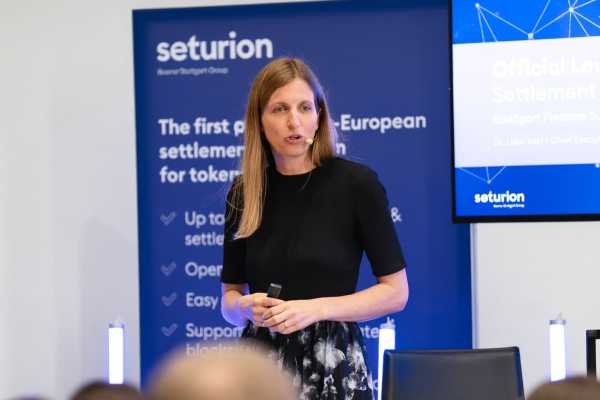Seturion of the Stuttgart Stock Exchange: Using blockchain against central securities depositories

“We have built a pan-European settlement platform on which we can settle transactions with tokenized securities,” explains Seturion CEO Lidia Kurt in an interview with BTC-ECHO at the Finance Summit in Stuttgart. Settlement means the exchange of cash for an asset after a trade. “Our solution works without counterparty risk, without central custody, and without pre-funding.”
If blockchain, then without a central depository
The core of the model: Blockchain replaces the central authority. “We're making the central securities depository obsolete, not the Bundesbank. We're using the Bundesbank's payment system, because central bank money is the money banks currently want to use for settlements.” The paradigm is shifting: “There's no longer any need to maintain a database and record who owns what. The assets are on the blockchain—that's now the database.”
Seturion is thus sending a strong signal to its Frankfurt-based competitors, specifically Clearstream, Deutsche Börse 's central securities depository. This cash cow must increasingly ask itself what it will be needed for in the future when all assets are digital.
Seturion deliberately does not commit to any specific standards – neither on the money side, where it is open to regular central bank money, CBDCs, and stablecoins, nor on the asset side, where it supports both public blockchains such as Ethereum and restricted DLT systems.
Seturion wants to unleash liquidity
The benefits are tangible: “We're talking about cost reductions of up to 90 percent – both in issuance and processing. This applies to the various asset classes, such as structured products, bonds, or money market instruments.”
This could be a game changer, especially for treasury departments of large corporations: “Today, it takes two days for liquidity from the sale of a money market fund to become available again. With a tokenized security and processed via Seturion, this can be done in minutes.”
Kicking silos for a European capital markets union
Another advantage lies in the dissolution of national silos: “Central securities depositories are siloed in every country. This makes it complicated to process securities transactions across borders. This hurdle disappears because blockchain knows no borders.” Seturion thus also addresses a core weakness of the European capital market: “If we break down the silos and overcome fragmentation, we promote a unified EU capital market.”
Given our weak capital market in the EU compared to other regions that do not have to contend with such a patchwork, this would be an important piece of the puzzle to bring us a little closer to the vision of a capital market union.
Stuttgart Stock Exchange: Fighting EU monopolies with Seturion?
The Stuttgart Stock Exchange is predestined for this innovation. “We are the sixth-largest stock exchange group in Europe – and the largest without its own central securities depository. This is precisely why we can think outside the box and drive innovation. When you operate a monopolistic central securities depository, the incentive to revolutionize the system is very low.”
With this move, the Stuttgart Stock Exchange is unlikely to win over national central securities depositories and their affiliated exchange operators. Yet this is precisely the essence of blockchain technology: It eliminates unnecessary intermediaries.
Now we have to deliver
Seturion's launch looks promising – but only next year, when the platform goes live, will it become clear whether Seturion delivers on its promises. The competition isn't sleeping, and players like 21X are already live with a secondary market.
It will be interesting to see how quickly Seturion manages to get the horsepower on the road. It also remains exciting to see which trading venues in Europe will connect to Seturion in the future to use the settlement platform as secondary markets.
Recommended Video Massive breakthrough for stablecoins – billions for crypto?

Eine Quelle: btc-echo.de



